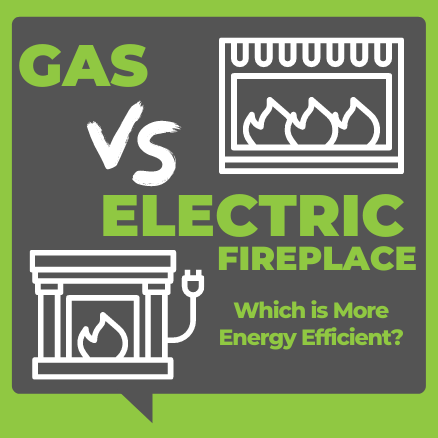Factors That Influence the Energy Efficiency of a Fireplace
Fireplace safety is important but so is energy use. If you’re thinking about adding a fireplace or replacing an existing one, you’ve probably wondered which type is the most efficient. In addition to traditional wood-burning fireplaces, there are electric and gas fireplaces. Due to convenience, many people today choose to go with either a gas fireplace or an electric fireplace.
But which one is more energy efficient?
Before jumping into the energy efficiency of electric and gas fireplaces, it’s important to understand what goes into determining efficiency. For fireplaces there are three considerations:
- Wattage of the fireplace (electric) or Btus used (gas)
- The amount of Btu (British thermal units) generated – amount of heat produced
- The heated area – how much space it can heat
Wattage is tied to the other two factors when determining energy efficiency. Essentially, the Btu and square footage of heated space per watt indicates the efficiency of an electric fireplace.
The higher the Btu count is the more heat the electric fireplace will produce. The heated area isn’t determined by the Btu as much as the fireplace’s ability to circulate the heated air throughout the home.
Special energy efficiency features can also make a difference. For example, some fireplaces come equipped with infrared technology and thermostats. Other energy saving features include controls for adjusting the heat output.
Energy Consumption of Electric Fireplaces
Eco Cost Savings decided to analyze 117 electric fireplaces to better understand how much energy they use and whether or not they are efficient. What their study found was on average an electric fireplace uses 1-1.5 kilowatt hours (kWh) of electricity an hour when in use. The most energy efficient electric fireplace that was tested was able to heat 1 square foot of space for every watt even though Btu was in the low range.
Even at 1 square foot per watt, electric fireplaces are considered energy hogs compared to other appliances. But given that the electricity that’s used is turned into heat and it can be a more efficient heating source, electric heaters can still be considered energy efficient if they lower the use of a central heating system.
Energy Consumption of Gas Fireplaces
Are gas fireplaces this energy efficient? There are two things that make comparing the energy efficiency of gas fireplaces and electric fireplaces somewhat complicated:
- Gas fireplaces tend to generate a lot more heat than electric fireplaces.
- Vented gas fireplaces let some hot air outside, but unvented ones don’t.
Gas fireplaces typically use 7,000-16,000 Btus, but they generate three times more heat than an electric fireplace. They also heat the space more quickly. Where gas fireplaces fall short is the conversion from energy to heat. Electric fireplaces convert 100% of the energy into heat, whereas gas fireplaces convert 70-90% of the energy used into heat.
Although electric fireplaces may convert energy into heat better, they may end up getting used more hours than a gas fireplace to generate the same amount of heat. You’re also more likely to need another heat source, like the furnace, to keep the home or a room sufficiently warm.
Electric Fireplaces May Still Be Powered by Gas
There’s one last thing to think about from an environmental perspective. If the electricity that powers your home is generated by natural gas, then it can be argued that an electric fireplace is actually using gas. Today around 40% of electricity is generated by natural gas. It’s the single biggest source of electricity in the U.S.
Which Fireplace is the Most Energy Efficient?
The answer is – it depends. In most cases, an electric fireplace uses less energy. However, it may need to be used for more hours or the temperature may need to be turned up higher in order to produce the same amount of heat as a gas fireplace. And if the electric fireplace doesn’t produce enough heat central heating or other heating devices may need to be used.
Generally speaking, for smaller spaces an electric fireplace is going to be the most energy efficient option. But for a larger space it may be best to go with an unvented gas fireplace with thermostat controls that can help improve efficiency.
RELATED READ: Which is Best: Natural Gas or Electric Pool Heaters?
With Verde Energy you know your electric fireplace is extremely energy efficient because our green energy plans are powered by renewable resources. Use your zip code to see if Verde Energy plans are available in your area.



